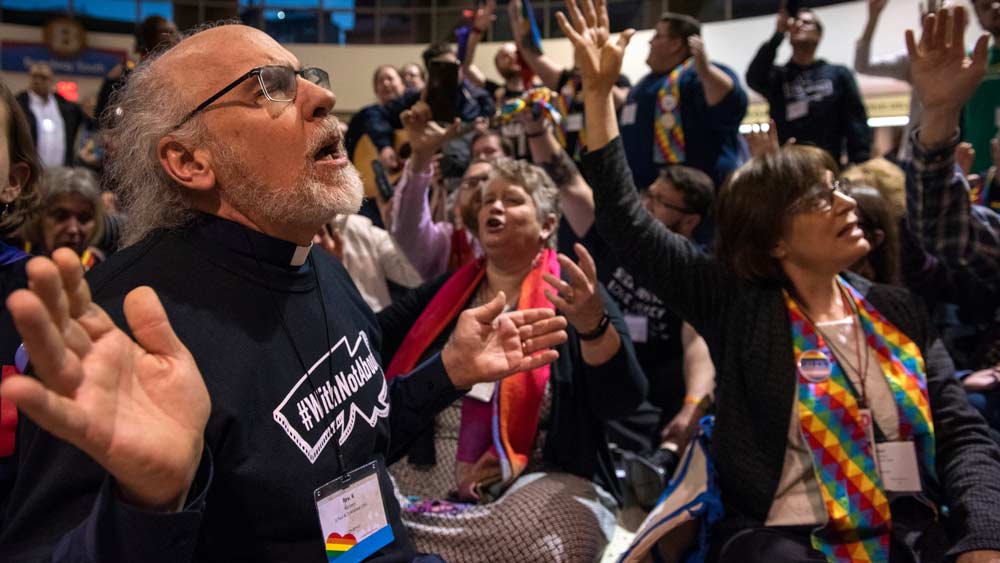June 17, 2011
Think Tank Assesses NY Marriage Impact
Kilian Melloy READ TIME: 4 MIN.
If New York state lawmakers send a marriage equality bill to the governor's desk -- now before the State Senate, with the State Assembly having already approved it -- Gov. Cuomo, who introduced the legislation, will sign it into law. What would that mean for New York, and for the nation?
Law and public policy think tank the Williams Institute provided some answers, even as New York's lawmakers kept up the suspense over the fate of the bill, and the families it will directly affect.
A June 16 press release said that, among other findings, the Williams Institute noted that an estimated 42,600 gay and lesbian families reside in the state. About 9,000 of them have celebrated marriage ceremonies in jurisdictions that allow same-sex couples to wed.
A number of countries around the world offer all their citizens marriage parity, Canada being among them. In the U.S., five states currently offer marriage equality. Though New York does not as yet offer marriage rights to same-sex couples, the state will honor marriages granted elsewhere.
According to the Williams Institute, about 7,200 of those 42,600 families have children. In all, gay and lesbian families in New York include about 14,000 children.
Because New York is so populous, if marriage parity were to be extended to residents in that single state, the total number of Americans living in a place where marriage parity is a matter of law would double, the Institute found, skyrocketing to 11.4% of the total U.S. population from its current level of 5.1%. That could have a significant effect on the national struggle by same-sex families to achieve full-fledged legal parity.
"I think it certainly has an impact on the litigation" that GLBT equality advocates have brought against anti-gay laws such as DOMA and Proposition 8, Williams Distinguished Scholar Dr. Gary J. Gates told EDGE.
"It's hard to know exactly how much," Gates continued, "but to the extent that they are litigating Prop 8, which [concerns] a big state like California, if New York were to pass marriage equality it would signal that there's another big state that's doing this, and that the momentum has potentially shifted."
Indeed, a shift can already be noted in the social climate. The latest polling data show that not only does a majority of New Yorkers -- 58% -- agree that gay and lesbian families should be allowed to marry, but also, for the first time, a bare majority of Americans in general thinks so.
"Certainly, the polling data suggest that this has been an issue that has, relative to other, highly controversial issues, shifted in a very short period of time," Gates noted.
Because gays and lesbians are part of the population at every socio-economic level and in every demographic, the fact that the number of people in the general population living in marriage equality states would double would also be reflected in the GLBT demographic. The number of gay and lesbian families living in marriage parity states would jump from about 7% of the nation's total to 14.3%.
The legal climate in and of itself seems to have a significant impact on same-sex families. In states that allow marriage parity, well over a third of gay and lesbian couples -- 38% -- have wed, the Institute noted. In other states, where same-sex couples face degrees of legal recognition that vary from civil unions to domestic partnerships to no legal acknowledgement or protections whatsoever, only 12% have traveled to places where they would be free to marry.
Except for rare instances, such as New York, those couples then return to states that will not recognize the marriages that other jurisdictions have bestowed. States are allowed under the provisions of an anti-gay federal law from 1996, the so-called "Defense of Marriage" Act, to ignore the civil contract of marriage when it is granted in other jurisdictions, despite the "full faith and credit" clause in the U.S. Constitution, which mandates that contracts and other legal agreements entered into in any one state must be recognized and honored by all the other states as well.
Because of DOMA, gay and lesbian married couples can find that they are rendered legal strangers to one another -- and to their children -- simply by crossing a state line.
As of June 16, New York's State Senate remained deadlocked, with equal numbers of lawmakers in the chamber for and against the measure. Two Republican lawmakers were undecided, but two others had stated they would support the measure, despite heavy pressure and threats from anti-gay groups.
But threats issued by New York's powerful Conservative Party and by the National Organization for Marriage (NOM) to work to unseat any New York Republican lawmakers who support a marriage equality measure might not impress state senators who act from conviction, especially if they know their history on such issues.
"[T]he threats of opponents of marriage equality to unseat legislators who support it, for the most part, that's not been a terribly effective strategy" in the past, noted Gates. "There's not been a lot of evidence that voting in favor of marriage equality has been a problem when legislators" come up for re-election, he added.
Senate leader Dean Skelos had not as yet scheduled the measure to come up for a vote.
Kilian Melloy serves as EDGE Media Network's Associate Arts Editor and Staff Contributor. His professional memberships include the National Lesbian & Gay Journalists Association, the Boston Online Film Critics Association, The Gay and Lesbian Entertainment Critics Association, and the Boston Theater Critics Association's Elliot Norton Awards Committee.


